Apples are well-liked, for good reason. They are one of the most nutrient-dense fruits on the planet.
These crunchy fruits come in varieties, each with its own unique flavor and texture. Depending on individual preferences, they can be eaten on their own, turned into juice, or used in cooking.
However, apples don’t last forever. Depending on several factors, apples may last 3–5 days to weeks or even months.
In this article, we’ll explore the factors that can influence how long your apples last and how best to store them and extend their freshness.
Let’s go!
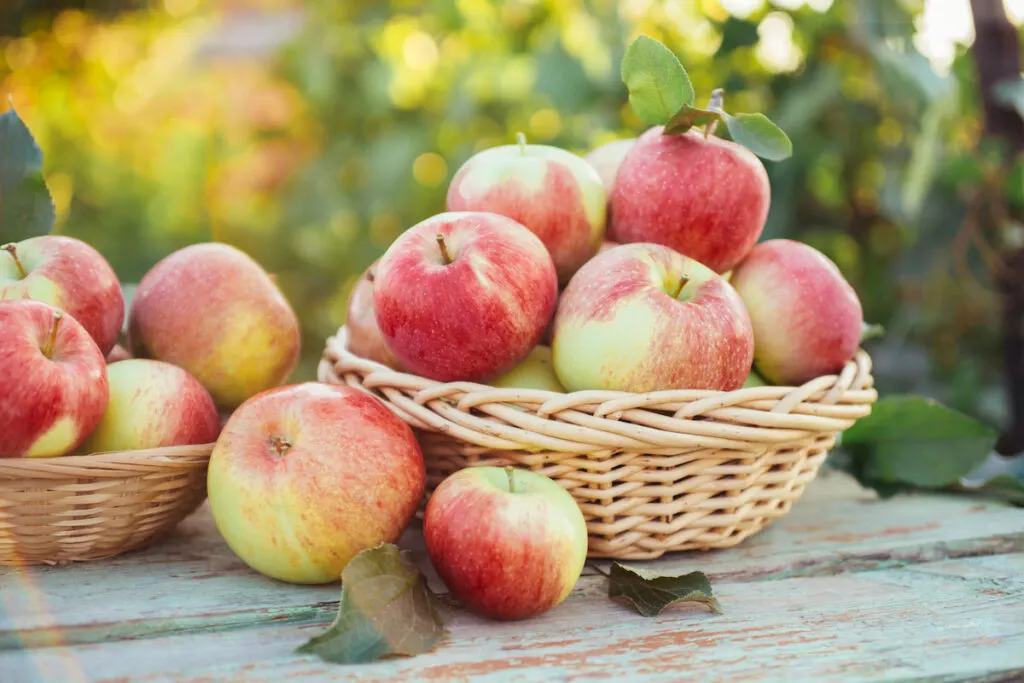
Table of Contents
Apple Shelf-Life
| Apples | Countertop | Fridge | Pantry | Freezer |
| Fresh (Whole) | 2–7 days | 4–6 weeks | 3–4 weeks | 8 months |
| Fresh (Sliced) | 1–2 days | 3–5 days | — | 8 months |
| Cooked (Apple pie) | 1 day | 3–5 days | 1–2 days | 2 months |
| Applesauce | — | 7–10 days (Unopened) 4–5 days (Opened) | 1–2 days | 6 months |
Factors That Can Affect the Shelf-Life of Apples
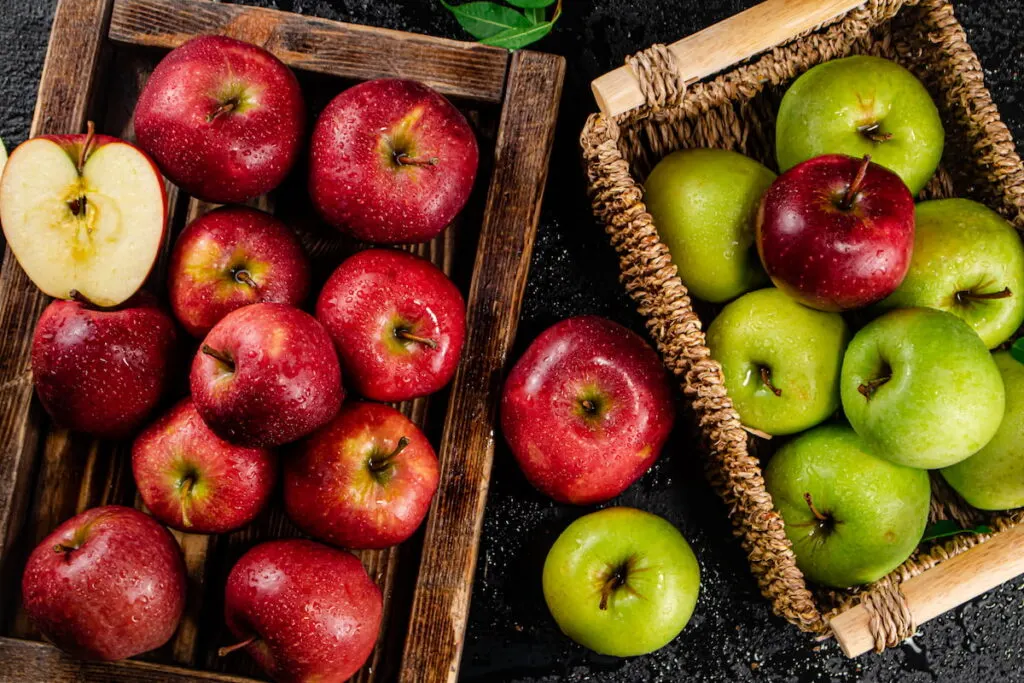
The Type of Apple
At least 7,500 varieties of apples are grown worldwide. The variety of the apple you have can affect how long it lasts.
Some varieties have a shorter shelf life than others, while others have longer.
Generally, the firm and tart varieties last longer than softer and sweeter ones.
Storage Conditions
The shelf life of an apple can be significantly influenced by how well it’s stored.
Ideally, they should be stored at temperatures between 30–40°F (0–4°C). If they’re stored at room temperature, they should be kept away from direct sunlight and heat in a cool, dry place.
Ripeness
Ripe apples will definitely not last as long as those that are unripe. Because they are ripe, they are more susceptible to decay than the unripe ones.
If you buy apples in bulk, you’ll need to mix ripe and unripe ones.
The unripe ones can then be kept at room temperature until you’re ready to eat them.
If you only buy ripe ones, they may have lost their freshness by the time you’re ready to eat or use them.
Bruising
Bruising can affect the shelf-life of apples.
Once there’s a bruise or cut, the apple becomes more susceptible to microbial contamination, which can lead to the growth of mold or decay.
To minimize bruising, handle your apples with care and avoid dropping them.
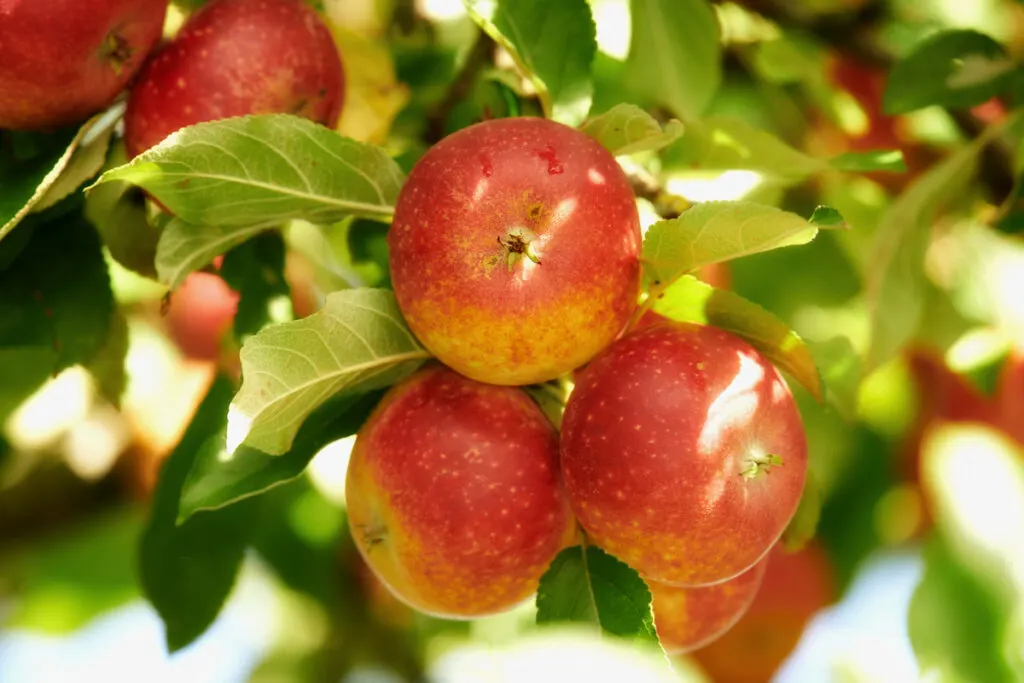
How Long Do Apples Last?
Apples can last anywhere from a few days to several months, depending on the factors listed above.
The shelf-life of apples can also vary, depending on if they are:
Fresh Apples
Fresh apples stored in the refrigerator can last 4-6 weeks and about 8 months if frozen. They only last about 1–2 weeks if stored at room temperature.
Ensure you check them for signs of discoloration or spoilage.
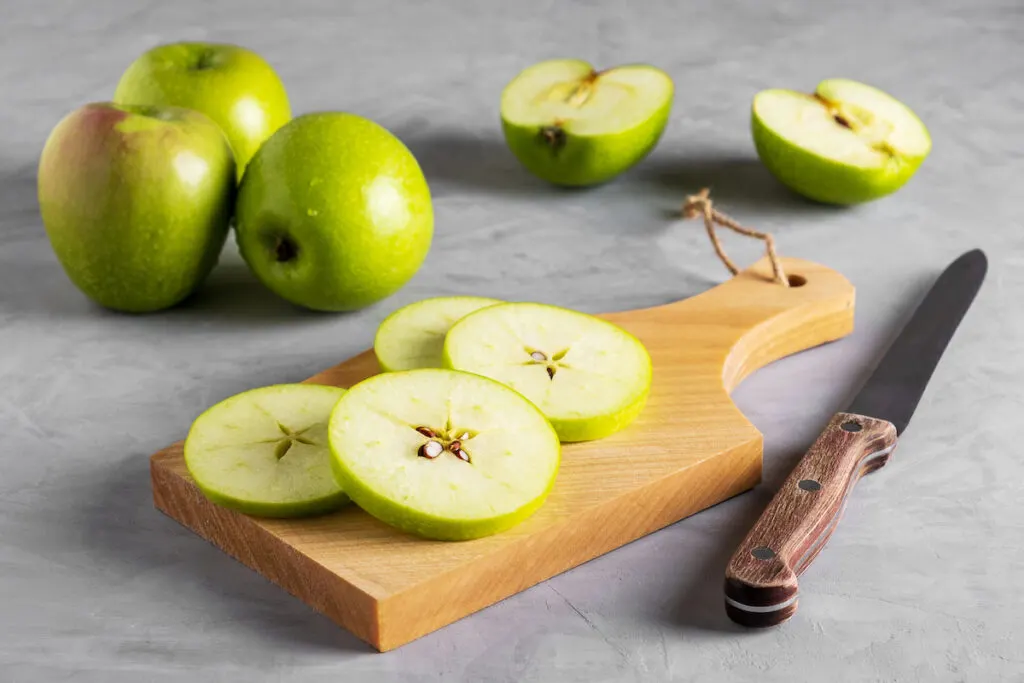
Cut Apples
When an apple is cut, it undergoes oxidation and turns brown. This doesn’t necessarily mean that it’s spoiled, but it can affect the flavor and shelf-life of the apple.
To reduce browning, sprinkle some lemon juice on the cut surfaces, and store the apple in an airtight container with a damp paper towel.
Cut apples last 3–5 days in the refrigerator and 1–2 days at room temperature.
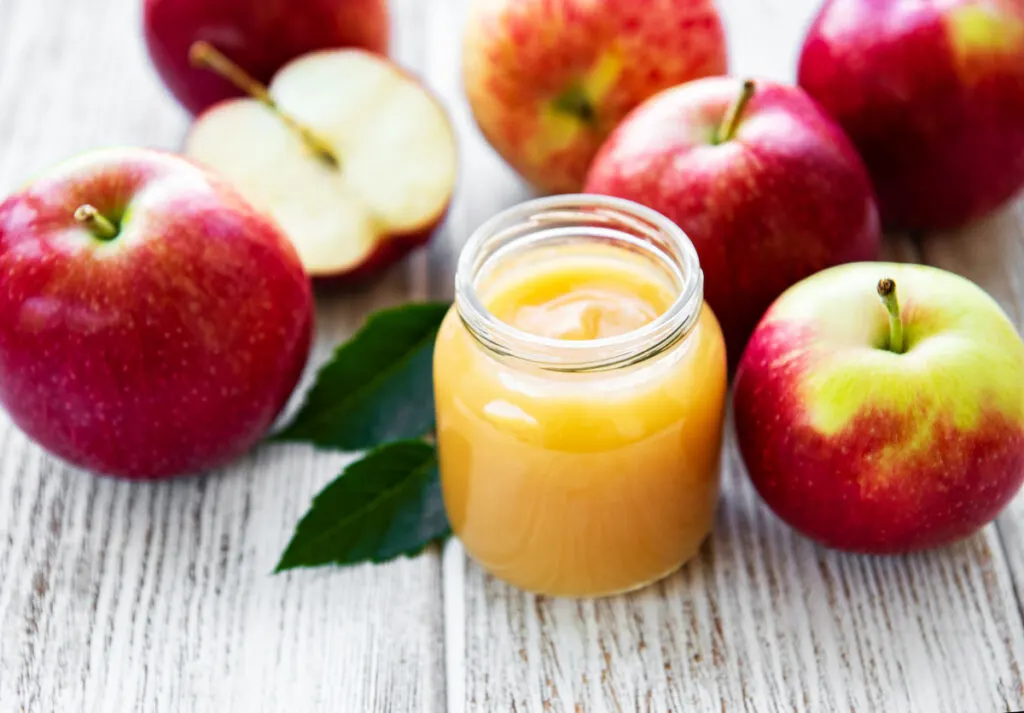
Applesauce or Apple Pie
Homemade applesauce normally lasts 1–2 weeks in the refrigerator and up to 6 months in the freezer.
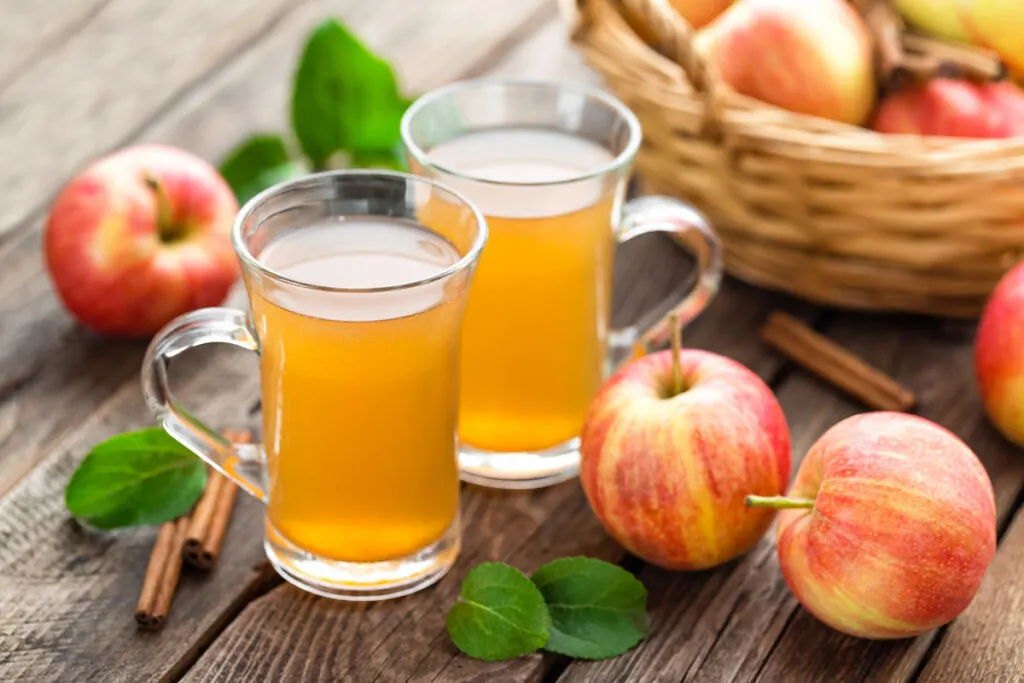
Apple Cider
Freshly squeezed apple juice or cider should be consumed immediately or within a few days of being made. If you buy from a store, be sure to check the label for an expiry date.
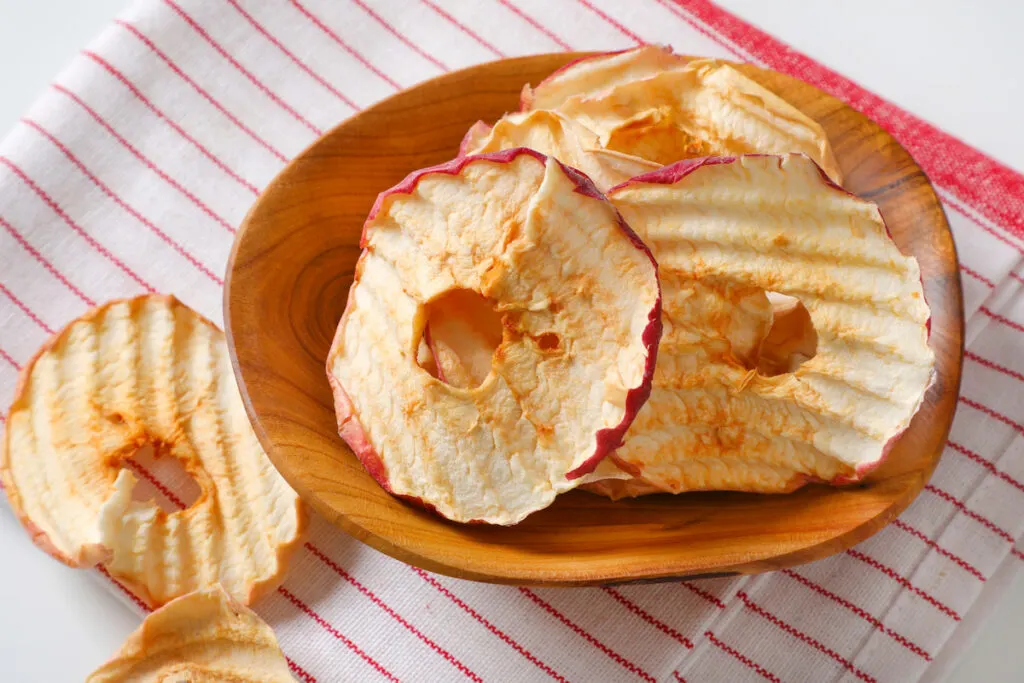
Dried Apples.
Dried apples have little to no moisture content, so they don’t support the growth of microbes. They can last several months if they’re kept in an airtight container.
The Best Way to Store Apples
The best way to store apples largely depends on how you intend to use them, how long you want them to last, and your storage options.
Some of the ways to store your apples are:
Short-Term Storage
For short-term storage (usually a few days), keep the apples at room temperature in a cool, dry place. Also, ensure that they’re not exposed to direct sunlight or heat.
Keep them in a single layer in a basket on your countertop, and ensure you check them regularly for signs of spoilage.
Medium-Term Storage
If you’re keeping your apples for a few weeks, you can store them in the refrigerator.
Keep them in the crisper drawer, which has the right temperature and humidity to keep them fresh.
Long-Term Storage
For long-term storage, you can either freeze or dry the apples. To freeze the apples, peel, slice, and pack them into freezer-safe containers.
To dry, slice them thinly and put them in a dehydrator or oven to dry on low heat.
Both frozen and dried apples can be stored for up to 8 months.
How to Know When to Throw Apples Out
Knowing when to throw out apples is vital to ensuring that we consume safe food. To determine if your apple is safe for consumption or if it needs to be thrown out, here are the signs to look out for:
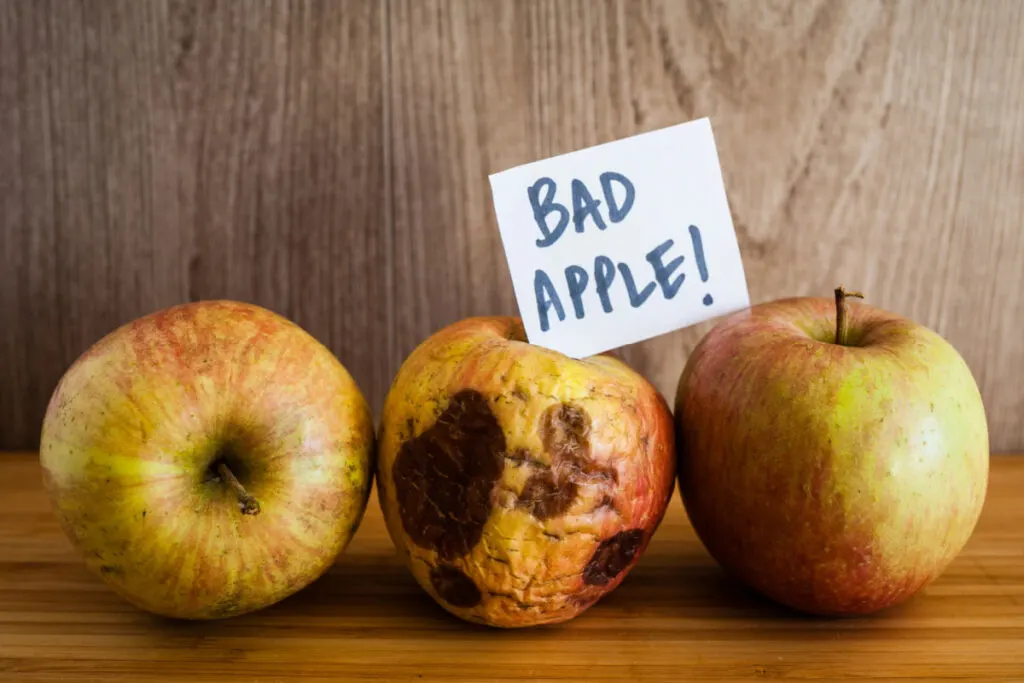
Discoloration
If the apple has a discolored patch, often brown or black, it indicates that it is no longer fresh and needs to be thrown out.
Discoloration often points to the fact that the fruit is being decomposed by fungi or bacteria and, as such, is unfit and unsafe for human or animal consumption.
Unpleasant Smell
This is often easy to detect. If there’s an unpleasant or odd smell coming from the fruit, it indicates spoilage/decay.
Softness
Apples are generally firm to the touch, so if the apple feels mushy or soft, it is no longer fresh and should be discarded.
Mold or Decay
If you notice any mold or spots on the apple, it is time to throw it out. Mold can spread quickly, and consuming moldy apples can be harmful to your health.
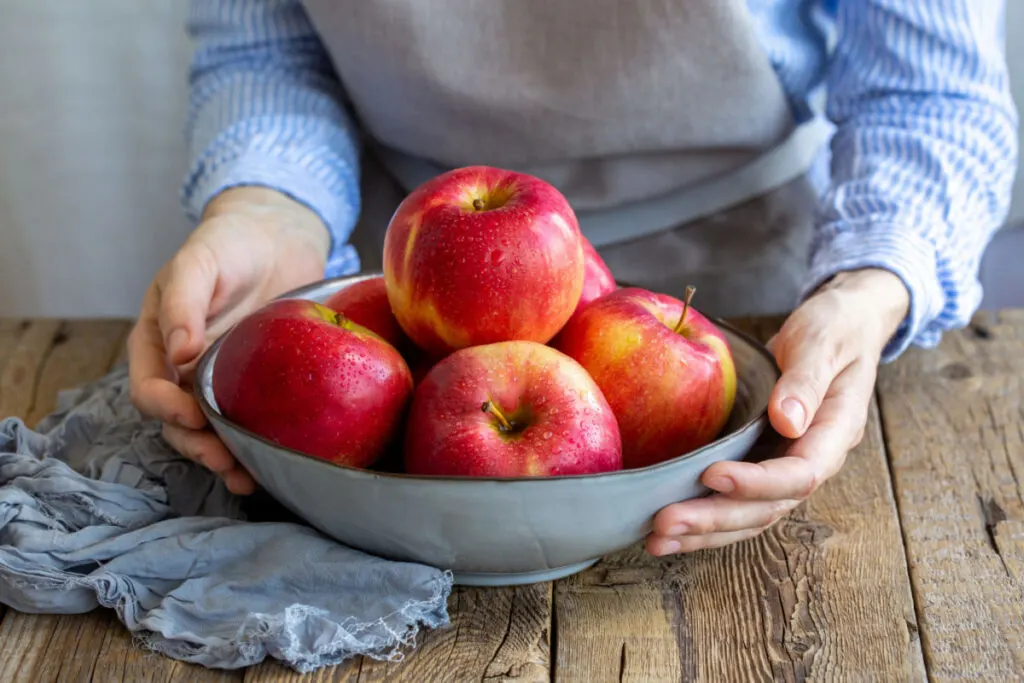
Tips to Make Your Apples Last Longer
Here are some tips to help you keep your apples fresh and make them last as long as possible.
Store Your Apples the Right Way
Before storing apples,
- Clean them thoroughly
- Dry them
- Wrap them individually in a paper towel
If you’re keeping them in the refrigerator, put them in a perforated plastic bag to prevent moisture from accumulating around them.
If you’re storing them in the pantry, avoid piling them up. Keep them in a single layer in a basket in a cool, dark, and dry place.
Store Them Alone
Fruits or veggies like bananas, tomatoes, and avocados produce ethylene gas that causes other fruits to ripen quickly.
Storing your apples with fruits like that can make them spoil faster.
Also, different fruits have different shelf lives, and if the fruit you store your apples with spoils quickly, it’ll definitely spread to the apples. So store them separately from other fruits.
Handle Them Carefully
Ensure you carefully handle the fruits and prevent scrapes, cuts, or bruises. Separate bruised apples from those that you plan to store.
Check the Apples Regularly
Check your apples regularly for any sign of spoilage, and discard any moldy or soft apples to prevent contamination of the whole stock.
Summary
Apples are a healthy and versatile fruit that can be enjoyed in many ways. How long they last largely depends on how well we store them.
By following the tips shared above, you can ensure your apples stay fresh and delicious, make the most of them, and enjoy them for as long as you’d like.
Resources
- https://www.doesitgobad.com/do-apples-go-bad/
- https://watchlearneat.com/how-long-do-apples-last/
- https://www.healthline.com/nutrition/how-long-do-apples-last#increasing-shelf-life
- https://www.stilltasty.com/fooditems/index/16383
- https://www.luckybelly.com/do-apples-go-bad/
- https://www.eatbydate.com/fruits/fresh/apples-shelf-life-expiration-date/
- https://www.masterclass.com/articles/how-to-store-apples
